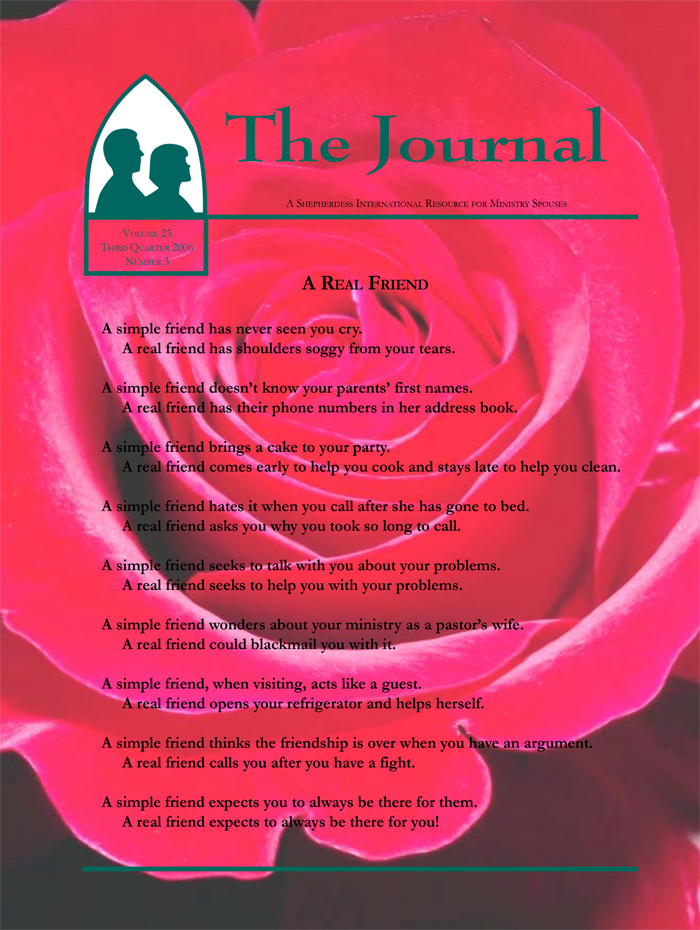A master watch-maker who had contracted an incurable illness designed a new watch that had letters instead of the numbers on the face, twelve in all. If you read them in their order they spelled the sentence: ‘Time is favour’. This man was aware of the fact that every hour that he had left to live was a gift or grace” (origin unknown).
The notion of “time” is relative, and we all experience the time we have been given in different ways. There are moments when time flies and we wonder where it has gone. This is the case when we are occupied with hobbies we enjoy, when we are together with people we love, when we do things that will not leave our thoughts, or have work that we must concentrate on. In other situations, time passes slowly, as if it were crawling: when we have to accomplish something that is unpleasant (a visit to the dentist, maybe?), when we are in pain when we are worried about the results of a medical check-up, or when we are in a most embarrassing situation in which we wish that the earth would open up and swallow us. For a child, days are often very long, but in the course of the years, our feeling for time changes. The older we get, the more we have the impression that time rushes past us. I am sure that the older ones among us will endorse this. A man is reported as saying on his deathbed: “My life seems to me as if I had only once walked up the street in which I live and then back—and now it’s over.”
Time—how to plan it and how to fill it—has become a problem for many people today. Many people have too much time. They are bored, a feeling of meaninglessness rules their life, they are lonely, and they have low self-esteem. One day slowly follows the other in monotony. There is no change. These people become dull and depressive. On the other hand, others have too little time.
Mountains of dirty laundry pile up, disorder gets the upper hand, the telephone rings constantly, a lot of things just don’t get done, and undone work keeps being pushed up. They feel hassled and stressed: in their thoughts they are constantly occupied with the next thing to be done and never get to rest.
Time passes and we have no power over it. The past cannot be relived or repeated. We can undo nothing. To get a grip on time, we try to divide it into compartments: time for sleeping, for eating, for working, for recreation, for vacation. The people in Bible times divided their time into portions: “There is a time for everything, and a season for every activity under heaven” (Eccl. 3:1).
We realize again and again that it is not easy to organize our time. How often have my children come to me and I have said to them: “I don’t have time!” What does this expression really mean? Maybe I don’t have the time just at this moment; maybe I will have time later. Or maybe I don’t want to have time for their concerns. Sometimes it means that I am not interested in the thing or the person. With the words, “I don’t have the time,” we show that we have set priorities in our life. Some things are more important than others. Sometimes we do that consciously, but often it has to do with our preferences. The sentence: “I don’t have time” should be used carefully and frugally, because the most important time is the moment I am living right now, and the most important person is the one who is beside me right now. God gives us 24 hours every day—1,440 minutes, 86,400 seconds of time. What do I do with it? Do I use it in a positive way, or do I waste it? How we fill up our time depends on what is important for us and what is not. Sometimes God considers that in a different way than we do. If we allow Him to, He may mix up our plans completely. If we listen to God and let Him plan our time, He will put things in the right order: time for God, time for others, time for me.
Time that has passed will never come back; it is gone forever. Sometimes we have neglected something and realize too late: “Oh, had I only. . .” but unfortunately I didn’t. Our time is a precious gift from God, and one day He will make us accountable for the why, how, and with what we have spent our time—if we made good profit of it or wasted it. Nobody knows when his or her time will be over or when another person’s will be over, and so God wants us to live consciously and give of our time to the people living beside us, showing them that they are valuable and important. Everyone needs the gift of time from others, otherwise our lives could not function. Maybe the best way to show others that we love them is to share with them the most valuable thing we have—our time.
Lord, my watch has scared me.
My eyes fell on the second hand.
With a soft tick it is counting
the seconds of my life.
Lord, they make me afraid,
those countless moments of my life,
that I have wasted or spoiled.
Because not one will return,
so that I could live it again,
so that I could live it better.
A word at the right moment,
listening silently at the right time,
a hand-shake,
a present,
can change a whole life.
The right thing at the right moment
to discern and in love accomplish,
that is, Lord, what I ask of you.
—Paul Roth (free translation)
